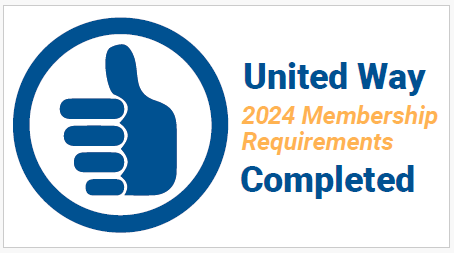YOU ARE HERE: Financial Accountability
Financial Accountability
United Way is looking to the future as our community needs continue to grow.

We know that you think carefully before giving and we thank you for entrusting us with your generous contributions of time and money. Our promise to you is that we will invest in the efforts that get the greatest results. We will evaluate and reward results, not just effort. And we will govern ourselves at the highest degree of accountability and transparency. Finally, we pledge to remain one of the most efficient non-profit organizations in the world, working to put the maximum amount of resources into the work that strengthens lives and communities.
Each United Way is independently governed by a local volunteer board, in order to best meet our local needs and opportunities. We adhere to a stringent set of membership standards that focus on governance, ethics, financial management, and general operations.
United Way brings together citizens, community leaders, business, the faith community, government, non-profit organizations and other institutions to determine the most critical human issues that require collective, not just individual, action. United Way then raises money locally in an annual campaign, generates other revenue outside of the campaign, secures non-cash in-kind resources, and advocates for sound public policy, along with employing other relevant strategies in order to produce concrete results.
United Way is one of the few remaining nonprofit vehicles to pool donor investments in order to create a greater return on the individual investment. United Way is helping to create a focused agenda and investing in strategies that show results.
As an investor, United Way is a key strategic partner in achieving your philanthropic aspirations. United Way can connect your aspirations to need and opportunity with the capacity and breadth to make your investment more powerful.
Through United Way, you get the scale and capacity of a $5 billion global enterprise organized and operated at a community level, making it accessible to you. We’re big and we’re small at the same time.
The measure of a community is how well it treats those with the least. The health and prosperity of a community begins with how it develops its human capital. Economic success over the long haul is not possible or sustainable without human success. There is no organization more focused on improving the human condition at a community level than United Way.
Just as important, UWSK’s entire financial operation is audited by an independent auditing firm and is always available for review by the general public. United Way of Southern Kentucky also annually files the IRS Form 990 return required for non-profit organizations, and both documents can be downloaded using the links on the right. IRS Subsection 501(c)(3)
IRS Form 990
Annual Audit
FREQUENTLY ASKED QUESTIONS:
What makes up the overhead costs?
In order to recover expenses incurred to raise, collect, administer and distribute contributions, United Way charges 10% for fundraising services and 15% for administrative services on all contributions. All nonprofit organizations have fundraising and administrative costs, and United Way of Southern Kentucky’s costs are well within the recommendations from the Better Business Bureau and IRS that non-profits spend no more than 35% on overhead costs.
What is the difference between administration and fundraising services?
Administrative expenses include investments in an organization’s infrastructure and operations. For example, staff dedicated to accounting and human resource activities, the applicable portion of information technologies devoted to these functions, governing board expenses, the production of an annual report, and management systems are typically classified as administrative expenses. Fundraising expenses include any costs incurred in the process of or with the intent of asking potential donors to contribute funds, materials, or time. Examples include staff time dedicated to donor development, direct mail expenses, maintenance of donor mailing lists, fundraising events, and more. Fundraising fees represent an investment that saves fundraising overhead expenses (pledge forms, staff time, etc.) from numerous agencies that receive United Way funding by performing that task for them.
Why are both fundraising and administrative costs necessary?
While both fundraising and administrative costs are necessary to support the sustainability of most public charities, the two types of expenses are not created equally. The current assumption is that low administrative costs are inherently desirable. In fact, under-investing in administrative costs is consistently linked with poor organizational performance and sustainability–trapping organizations in what Ann Goggins Gregory & Don Howard in the Stanford Social Innovation Review called, “The Nonprofit Starvation Cycle.” In essence, administrative fees exist to help support a nonprofit’s mission and goals.
For more information, please contact the United Way office at 270.843.3205.
- NEWS & EVENTS
